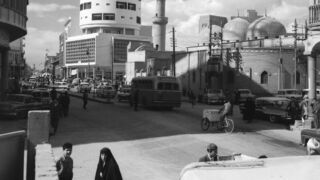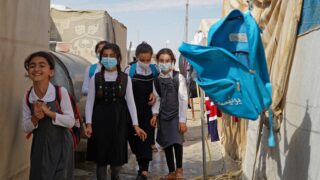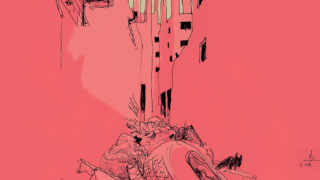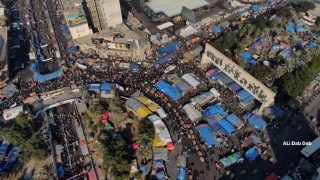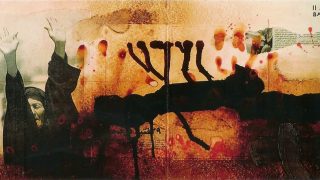It was as if angels and demons descended on the city of Nineveh together. The sky on the night of June 10 was cloaked with a worrying gloom. And within a few hours, the city had spectacularly fallen into the hands of the gunmen of the Islamic State of Iraq and Syria [DAESH for its initials in Arabic]. This despite the presence of something like 56,000 troops from various security forces-the army, police, and intelligence agencies, and despite the presence in the city of several military commanders whom Prime Minister and commander-in-chief Nouri al-Maliki considered his most reliable ‘hawks.’
Why did the city fall? Who is responsible? How will we get it back? What kind of solution should we seek-military or political? What is going to happen to Iraq now? Will it remain one country undivided? Or will it be broken up into confederations? Like a field of incessant crickets, the questions drown out everything in our wilderness of disbelief.
A thousand different story tellers are spinning their own narratives of what has happened: everyone it seems has their own explanation, except for the Iraqi government itself. The government is the only one who is not telling us its own version of the story: hiding it away in the file cabinets of ministries, allowing rumor and anecdote to inflate or diminish the shock of the event. The government asks us not to believe any version of events but its own, and then fails to provide us with any version at all. How, its critics ask, did Nineveh fall into the hands of armed groups in the space of four hours, in spite of all the millions spent on troops and weapons?
Chronicle of a Collapse Foretold
The armed groups practiced for this capture for many months, beginning last year. They tested their capabilities in several districts in the provinces of Sallahuddin, Al-Anbar, Diyala, and Babel. In their first attempt at occupying entire cities, they entered Baquba. They shut down the entire city, hung their banner over the police station, and occupied the town for several hours before being forced to withdraw.
This and the occupations which followed clearly indicated the future plans of the terrorist organization. However, the fact that the government was able to take back control of the occupied districts and towns raised unfounded hopes for victory. The pro-government media waved the flag, there were boisterous victory songs, and the prime minister, who could not (or did not want to) put an end to the months-long crisis in Al-Anbar, was clearly overrating himself, while dismissing his political opponents as corrupt and unpatriotic.
Writers and opinionmakers are closing ranks: For some, there are only DAESHis and Malikis; if you oppose Maliki’s policies during this “difficult time” you are a DAESHi, with questionable patriotism and need to be taught a lesson in nationalism. For others, anyone who tries to delay holding Maliki accountable for the collapse in Mosul, who urges waiting until DAESH is completely neutralized, is nothing better than his sycophant. They are trying to ensure he never leaves office, while he will be quick in turning the attention from his failure to a fistful of imaginary successes. In an attempt to make the Iraqis forget his decisions, he will open the drawers of his desk and release files of accusations against the politicians who are the cause of the fall of Mosul.
Maliki, who has always covered up and protected the military from its failures, will probably now try to burn the evidence that points back to a conspiracy in this disaster. Seeking to point the finger of blame at anyone but himself, he has referred 59 ranking military officers for prosecution. They are the ones, he claims, who are responsible for the fall off Mosul; some may well face a death sentence. And so the price for the failure of the commander in chief will be paid by others.
To replace the 59 indicted officers, he has reactivated officers who were previously forced out or moved to sinecures in recent years. But the real surprise was that he even brought back military officers who were close to Saddam Hussein. Some wise voices have already advised Al Maliki in the past to bring them back instead of letting them offer their services to illegal organizations. But the emperor who did jam in his party and his electoral list several known Baathist faithful servants of the former regime, insisted on not letting precisely those officers who were just in duty service and treated them as outcasts.
The debacle in Mosul has finally forced Maliki to reassess his approach; particularly given the number of experienced former army officers who have gotten involved in armed attacks, causing endless trouble for the government.
The guns have spoken in the places that fell into the hands of DAESH and its followers: after the fall of Nineveh, the Iraqi map will have to be redrawn to reflect the new geographic realities.
As usual the Kurds have climbed onto the moving train of events. From Tehran-where he had gone for a surprise visit right after the Mosul events-Kurdistan Prime Minister Nechirvan Barzani announced that “the post-July 10 Iraq is no longer the old Iraq.”In the mouth of Massoud Barzani, president of the autonomous Kurdish region, this was translated to “We have always considered Kirkuk an integral part of Kurdistan.” The Kurds took control of Kirkuk province and most of the other territory disputed with the central government; and once again the central government was left with nothing to say.
Inside Nineveh, tens of thousands of men who were ‘loyal’ to the Saddam Hussein regime are joining up with DAESH or the tribal gunmen, hoping to finally make their comeback after years as pariahs under the anti-Baath party law. That law, piled on top of the [American] order disbanding the old Iraqi army and most of the bureaucracy, and banning former employees from participating in public life, had long deprived them of their salaries and inmiserated their lives and those of their families.
The post-Saddam politicians of Iraq did not even try to separate those who should have been prosecuted from those whose experience and professionalism might have benefited the state, and thus failed to aim for even the smallest degree of national reconciliation.
The sound of gunfire is filling Iraq’s air, but the media war seems to be nearly as powerful as the weapons. All of the regional media, and particularly the satellite TV channels and newspapers from the Gulf states are suddenly covering events in Iraq moment to moment. But it is a troubling kind of coverage, using a language that only deepens the rifts that divide the Iraqi people.
Certain television channels for example speak of “revolution” when they refer to the gunmen who are fighting in Iraq’s north and west, while they refer to the Iraqi army as “Maliki’s army.”
To confront this Gulf media offensive we have the Iraqi government media, who have some of the highest-paid state employees in the country. They seem to be doing little but broadcasting tasteless songs that they imagine will boost the morale of the military and increase the mobilization of the masses. Supporting the government media are the private channels of various parliamentary deputies, which compete to outdo one another for idiocy and unprofessionalism.
On the Gulf channels, so called academics with hidden agendas speak in bloody phrases. On the Iraqi government media, they are met with drum-beaters and insult spewers, people with no expertise to analyze the complex situation the country finds itself in, and who can do little but spout slogans supporting the army, and say little that befits the seriousness of what is happening.
After the fall of Nineveh, a clamor that serves to silence anyone who asks why the army withdrew so rapidly, when they are not accused of treason for asking. An army, we should remember, that gets the lion’s share of Iraq’s total government budget.
Much of Iraq’s oil revenue is spent on the military and its growing budget: according to the International Institute for Strategic Studies, the army’s budget went from $12 billion in 2011, to $14.7 billion in 2012, and to $17.1 billion in 2013.
All of that money and all of those men are apparently not enough for our military leaders and Mr. Maliki, who on the heels of DAESH’s victory have begun building a separate reserve army. It will call up 2 million more men, thanks to the call for jihad by the country’s Shia religious authorities. Those 2 million troops will cost the state another billion dollars a month, since they will be paid a stipend of $500 a month; and that of course does not count the cost of training and arming them.
In spite all of this clank and clamor, the government is able to control a few cities in the daytime, while counting its losses every night. Which is why more and more people are asking: what is the Iraqi army really lacking? More weapons? More troops? Or more leaders?
Translated by: International Boulevard


